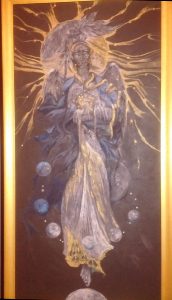Dear Yogis
As my heart is seeking it finds you in every soul I meet. – Ibn’ Arabi
This morning we can consider LOVE, and the story of Rumi the Persian Poet, and his lover Shams. It is a wonderful example of love, courage, service and duty. Love and death. When I listen to the words of Rumi, and the music, my heart also calls for the desert, but I have been put here to write to you, to be with you. I am not who you think I am. Do you know about you?
Rumi started his adult life as an authoritarian teacher, head of a community, strong husband, feared and honoured by most. A Judge. But inside he knew this was not life. Like the Christian Saint Peter, he was at heart a homosexual.. He had no passion, no love. Trying to be the person his family and community wanted him to be, he was strangling the person he was at his heart. These things have a way of surfacing, and so they did when he met Shams, and we are told, fell instantly in love.. (and that is another story – there are many).

This meeting with the Dervish, transformed Rumi from an accomplished teacher and jurist, to an ascetic. He left behind everything solid, everything stable to be with his Lover. We don’t know much about his wife and children, but at the end end he was buried with great honour in the family tomb. Reconciliation and acceptance occurred, and his poetry changed a community, a country, and then reached the world. Such is life – only the angels would understand.
Shams Tabrizi, Rumi’s love, an itinerant poet, mystic, had travelled throughout the Middle East searching and praying for someone who could “endure my company”. A voice said to him, “What will you give in return?” Shams replied, “My head!” The voice then said, “The one you seek is Jalal ud-Din (known as Rumi) of Konya” and the music was born.
However, on the night of 5 December 1248, as Rumi and Shams were talking, Shams was called to the back door. He went out, never to be seen again. It is rumoured that Shams was murdered with the connivance of Rumi’s son, ‘Ala’ ud-Din; if so, Shams indeed gave his head for the privilege of mystical friendship.
Rumi’s love for, and his bereavement at the death of Shams found their expression in an outpouring of lyric poems, He himself went out searching for Shams and journeyed again to Damascus. There, he realised:
Why should I seek? I am the same as
He. His essence speaks through me.
I have been looking for myself!
Rumi found another companion in Salaḥ ud-Din-e Zarkub, a goldsmith. After Salah ud-Din’s death, Rumi’s scribe and favourite student, Hussam-e Chalabi, assumed the role of Rumi’s companion. One day, the two of them were wandering through the Meram vineyards outside Konya when Hussam described to Rumi an idea he had had: “If you were to write a book like the Ilāhīnāma of Sanai or the Mantiq ut-Tayr of ‘Attar, it would become the companion of many troubadours. They would fill their hearts from your work and compose music to accompany it.” Rumi smiled and took out a piece of paper on which were written the opening eighteen lines of his Masnavi, beginning with:
Listen to the reed and the tale it tells,
How it sings of separation..
Hussam implored Rumi to write more. Rumi spent the next twelve years of his life in Anatolia dictating the six volumes of this masterwork, the Masnavi, to Hussam.
In December 1273, Rumi fell ill; he predicted his own death and composed the well-known ghazal, which begins with the verse:
How doest thou know what sort of king I have within me as companion?
Do not cast thy glance upon my golden face, for I have iron legs.
Rumi died on 17 December 1273 in Konya. His death was mourned by the diverse community of Konya, with local Christians and Jews joining the crowd that converged to bid farewell as his body was carried through the city. Rumi’s body was interred beside that of his father, and a splendid shrine, the Yeşil Türbe (Green Tomb, قبه الخضراء; today the Mevlana Museum, was erected over his place of burial. His epitaph reads:
When we are dead, seek not our tomb in the earth, but find it in the hearts of men.
HAVE A WONDERFUL DAY. The sun is shining, and there is a gentle breeze where there has been an icy wind.. beautiful.
Open your eyes, for this world is only a dream – Rumi
NAMASTE. JAHNE



